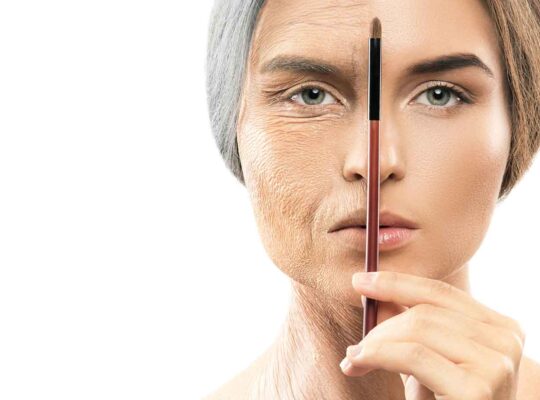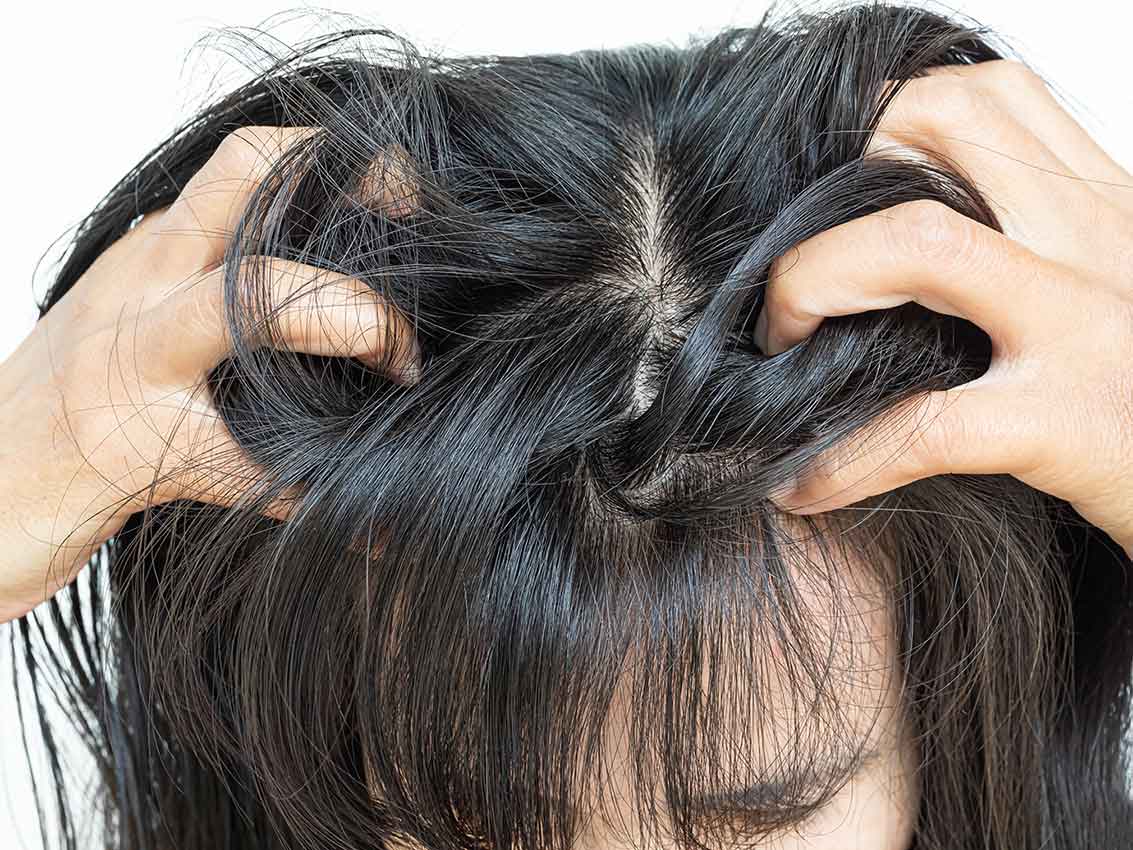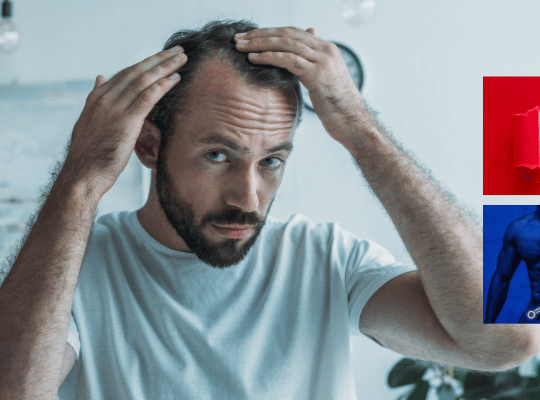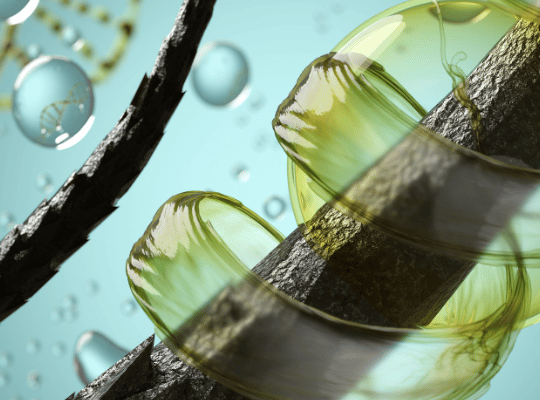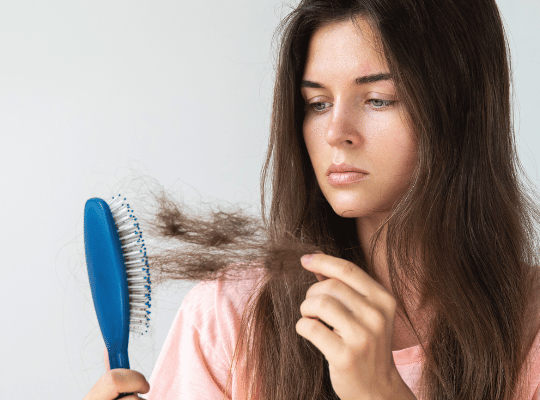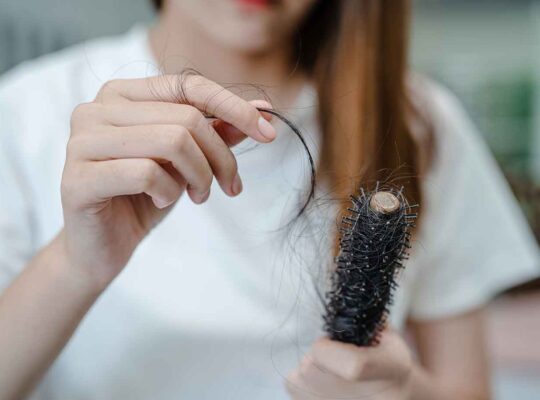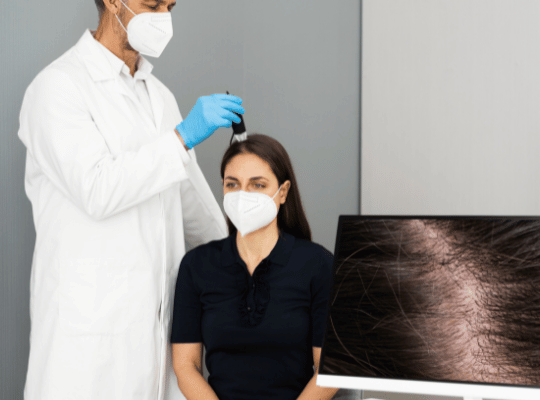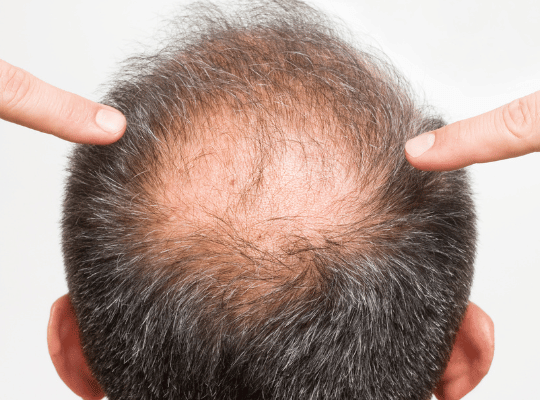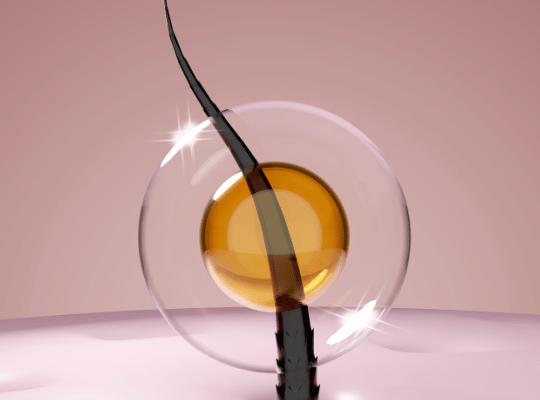Understanding Hair Loss and Itchy Scalp: Causes, Treatments, and Prevention
Do you ever notice that your scalp feels really itchy and that you’re losing more hair than usual? An itchy scalp and hair loss can be annoying, and they’re often related. It’s important to take care of both issues to keep your scalp healthy and avoid more problems in the future. In this article, we’ll talk about what causes an itchy scalp and hair loss, how you can find out what’s causing your problem, the best treatments available, and how to prevent these issues from happening.
Common Causes of Itchy Scalp and Hair Loss
To fix your itchy scalp and hair loss, you need to understand what’s causing them. Here are some of the most common reasons:
Androgenetic Alopecia (Male and Female Pattern Baldness)
Androgenetic alopecia is the most common reason for hair loss in both men and women. It’s often passed down through families and happens slowly over time. Men usually lose hair on the top of their heads and at their temples, while women’s hair thins out along the part. This condition doesn’t usually make your scalp itchy, but it can happen at the same time as other conditions that do.
Seborrheic Dermatitis
Seborrheic dermatitis is a skin problem that causes red, scaly patches and dandruff on your scalp. It often makes your scalp feel itchy and can cause temporary hair loss if you don’t treat it. This condition happens when a type of yeast grows too much on your skin and when your skin makes too much oil.
Scalp Psoriasis
Scalp psoriasis is an autoimmune condition, which means your body’s defense system is attacking itself. It causes thick, silvery scales and red patches on your scalp that are itchy. If you scratch these scales, you can damage your hair and make it fall out.
Fungal Infections
Fungal infections, like ringworm of the scalp (tinea capitis), can cause both an itchy scalp and hair loss. This infection is contagious, meaning it can spread from person to person, and it usually looks like round patches of hair loss with red, scaly, itchy skin.
Allergic Reactions to Hair Products
Allergic reactions to things like shampoos, conditioners, hair dyes, or other hair products can make your scalp itchy. If you scratch your scalp because it’s itchy, you can break your hair and cause it to fall out.
Diagnosing the Problem
If you have an itchy scalp and hair loss, it’s important to find out what’s causing them. Knowing the cause can help you choose the right treatment.
Importance of Professional Evaluation
It’s not a good idea to try to figure out what’s wrong with your scalp on your own. If you guess wrong, you could make the problem worse. A professional evaluation from a dermatologist (a doctor who specializes in skin) or a trichologist (a specialist in hair and scalp) is the best way to get an accurate diagnosis.
Common Diagnostic Methods
Here are some common ways doctors figure out what’s wrong with your scalp:
- Physical Examination: The doctor will look closely at your scalp and hair to check for things like psoriasis, dermatitis, or infections.
- Scalp Biopsy: Sometimes, the doctor will take a small piece of your scalp to look at under a microscope. This helps them find out if you have conditions like psoriasis or alopecia.
- Trichoscopy (Scalp Dermatoscopy): This is a special way to look at your scalp and hair using a magnifying tool. It helps doctors see if you have conditions like androgenetic alopecia or a fungal infection.
Treatment Options
After you know what’s causing your itchy scalp and hair loss, it’s time to think about how to treat it.
Topical Treatments
Topical treatments are medicines you put directly on your scalp. They’re usually the first thing doctors try to help with both an itchy scalp and hair loss.
| Treatment Type | Target Condition | Effectiveness Rating | Common Side Effects |
|---|---|---|---|
| Corticosteroids | Itchy scalp (seborrheic dermatitis, psoriasis) | High | Skin thinning, irritation, redness |
| Antifungal Medications | Fungal infections, itchy scalp | High | Temporary burning or itching |
| Medicated Shampoos | Itchy scalp, dandruff | Moderate to High | Dryness, possible irritation |
- Corticosteroids: These are strong anti-inflammatory medicines that can reduce itching and redness. They come in different forms, like creams, lotions, and foams, and are really helpful for conditions like psoriasis and seborrheic dermatitis.
- Antifungal Medications: These are creams or shampoos that kill the fungus causing infections like ringworm. They stop the fungus from growing, which helps reduce itching and hair loss.
- Medicated Shampoos: These shampoos have special ingredients like ketoconazole, selenium sulfide, or salicylic acid that can help control dandruff, reduce itching, and treat mild cases of seborrheic dermatitis.
Systemic Treatments
Systemic treatments are medicines that work throughout your whole body. These are often used for more serious conditions.
- Oral Medications for Underlying Conditions: If your itchy scalp and hair loss are caused by a condition like an autoimmune disease, you might need oral medicines to control the problem.
- Hormonal Treatments for Androgenetic Alopecia: If you have male or female pattern baldness, hormonal treatments like finasteride or spironolactone can help. These medicines reduce the amount of certain hormones that cause hair loss.
Advanced Therapies
If traditional treatments don’t work, there are some advanced options you can try.
- Platelet-Rich Plasma (PRP) Injections: This treatment involves injecting a part of your own blood, which is rich in platelets, into your scalp. This can help stimulate hair growth and heal your scalp.
- Low-Dose Naltrexone: This medicine was originally used to treat addiction, but in small doses, it can reduce inflammation and help some people regrow their hair.
Lifestyle Changes and Home Remedies
Besides medical treatments, making some changes to your lifestyle and trying home remedies can help manage an itchy scalp and hair loss.
Proper Scalp Hygiene
Keeping your scalp clean is really important. Washing your hair regularly with a gentle shampoo can remove extra oil, dirt, and product buildup that might be making your scalp itchy.
Dietary Considerations
What you eat can also affect your scalp and hair health. Eating foods rich in vitamins and minerals like biotin, zinc, and omega-3 fatty acids can help your hair stay healthy. Try to include foods like fish, nuts, eggs, and leafy green vegetables in your diet.
Stress Management Techniques
Stress can make both an itchy scalp and hair loss worse. Finding ways to reduce stress, like practicing yoga, meditating, or exercising regularly, can improve your scalp condition.
Prevention Strategies
Preventing an itchy scalp and hair loss is easier than dealing with them once they start.
Regular Scalp Care Routine
Having a regular scalp care routine is key. This means washing your hair regularly with a gentle shampoo, avoiding heavy styling products that can clog pores, and keeping your scalp hydrated.
Avoiding Harsh Hair Treatments
Harsh chemical treatments like hair dyes, relaxers, and perms can irritate your scalp and make your hair fall out. If you use these treatments, try to use them less often and always follow up with a deep conditioner to restore moisture.
Early Intervention at Signs of Scalp Issues or Hair Loss
If you notice that your scalp is irritated or that your hair is falling out, don’t wait to get help. Catching the problem early can prevent it from getting worse and make treatment more effective.
When to Seek Professional Help
Sometimes, home remedies and over-the-counter treatments aren’t enough, and it’s important to see a doctor.
Persistent Itching or Hair Loss
If your scalp keeps itching or you’re losing a lot of hair, it’s time to see a doctor. These symptoms could be signs of a more serious problem that needs medical attention.
Signs of Infection
If your scalp is red, swollen, has pus, or smells bad, these are signs of an infection. Infections need to be treated by a doctor to stop them from spreading and getting worse.
Sudden or Severe Hair Loss
If you suddenly start losing a lot of hair, it could be a sign of a serious condition. Seeing a doctor right away can help figure out what’s going on and start treatment as soon as possible.
Future Treatments and Research
There’s always new research happening in the world of hair loss and scalp health, and some exciting treatments are on the horizon.
Emerging Therapies in Hair Loss Treatment
Scientists are working on new treatments that could change the way we treat hair loss. For example, researchers are looking into stem cell therapy and gene editing as potential ways to regrow hair.
Advancements in Understanding Scalp Conditions
As we learn more about what causes scalp conditions like psoriasis, dermatitis, and alopecia, we’re getting better at treating them. This means more effective and targeted treatments could be available in the future.
Conclusion
Taking care of your scalp is just as important as taking care of the rest of your body. By understanding the connection between hair loss and an itchy scalp, you can take steps to prevent these issues from getting worse. Remember, it’s important to act quickly and get help if you’re dealing with persistent problems. With the right treatment and some simple lifestyle changes, you can keep your scalp healthy and your hair looking great.
FAQs About Hair Loss and Itchy Scalp
- Can an itchy scalp cause hair loss?
- Yes, scratching an itchy scalp can damage hair follicles, leading to hair breakage and loss.
- What’s the best shampoo for an itchy scalp and hair loss?
- Medicated shampoos with ingredients like ketoconazole, selenium sulfide, or salicylic acid are often recommended. It’s best to consult with a dermatologist for a shampoo that suits your specific needs.
- Are there home remedies that can help with an itchy scalp?
- Yes, maintaining proper scalp hygiene, using mild shampoos, and incorporating stress-relief techniques can help manage an itchy scalp.
- How do I know if my hair loss is due to a serious condition?
- If your hair loss is sudden, severe, or accompanied by other symptoms like redness or swelling, it’s important to seek medical advice.
- Can diet affect hair loss and scalp health?
- Absolutely! A diet rich in vitamins and minerals can support healthy hair growth and a healthy scalp.


